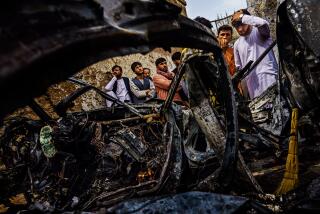‘If I had 100 lives, I’d give them all,’ he’d said
- Share via
KARACHI, PAKISTAN — They were nearly 10 years apart in age, but close in the way of brothers, not cousins. A day rarely passed when they did not speak.
Noor Ahmed, 34, a bank employee, joined the throngs of people who poured into the streets of Karachi on Thursday to welcome Benazir Bhutto. But after a few hours, he’d had enough of the dancing, drum-beating and chanting. He headed home to his wife and children.
Not so his cousin, Tahir Narejo, 25, married four months ago.
Narejo, said Ahmed, was so fired up by Bhutto’s return that he wanted to help somehow. He joined the ranks of security volunteers who spent the long day sticking close by the special steel-reinforced vehicle carrying the former prime minister.
“I said to him, almost joking, ‘Tahir, you know it’s dangerous,’ ” Ahmed recounted on Friday, squeezing his eyes against tears and the morning sun. “But he said to me very seriously, ‘If I had 100 lives, I’d give them all.’ ”
When the enormous blast echoed across the city just after midnight, Ahmed was in bed. Jolted awake, he immediately dialed Narejo’s cellphone number.
“It rang and rang,” he said. “He would always answer his phone. I knew something was terribly wrong.”
Throwing on clothes, he quickly mobilized other relatives. Some rushed to the scene, others to the nearest hospitals.
Another cousin located Narejo at last, grievously wounded in Karachi’s Jinnah medical center. He died just before dawn Friday.
Now Ahmed had a daunting task before him. By Muslim tradition, a body should be buried as soon as possible. But in Pakistan, even longtime urbanites feel a strong connection to their ancestral hometowns. Burial elsewhere would be unthinkable.
Their hometown is Mirpur Khas, about 170 miles northeast, deep in Sindh province. Ahmed knew what he had to do.
After dark, reached by phone, he said he had claimed his cousin’s body from the morgue, filled out the paperwork, arranged for a truck to carry the body on the six-hour journey, and alerted family members to prepare for immediate funeral rites.
“It is done,” he said, sounding utterly drained, but also like a man who had accomplished a necessary task. “He is home.”
--
More to Read
Sign up for Essential California
The most important California stories and recommendations in your inbox every morning.
You may occasionally receive promotional content from the Los Angeles Times.













